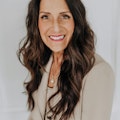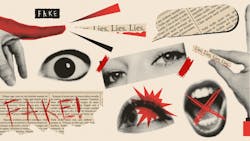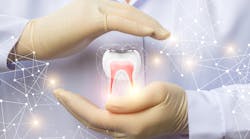Why critical thinking matters in dentistry’s misinformation age
Waht you'll learn in this article
- There’s a difference between misinformation and disinformation in dentistry.
- Credentials and charisma don’t equal credible expertise.There might be some red flags in sponsored education and social media content to be aware of.
- You must learn how to evaluate evidence, bias, and consistency in claims.
- Critical thinking is dentistry’s best tool against misinformation.
We live in an age of misinformation and disinformation. The difference between the two is important: misinformation is false or inaccurate information shared without intent to deceive, while disinformation is created to mislead, manipulate, or cause harm. In our industry, we grapple with both. I like to believe that what we see most is misinformation. The real question is, what are we going to do about it?
When I joined Instagram, it was mostly lighthearted content—dog videos, home inspiration, and the like. Over time, my feed evolved toward health care, dentistry, and now my need for comedy. A while back, I came across Layne Norton, PhD (@biolayne), a nutritional scientist, world champion powerlifter, and entrepreneur. What caught my attention was his approach: he doesn’t just share opinions; he breaks down the science.
What dental professionals can learn from science communicators
His content calls out misconceptions, debunks nutritional myths, and pushes back against sweeping generalizations or oversimplified interpretations of data. Because of that, he’s both popular and criticized. His commitment to evidence over noise, with a healthy dose of research, is the kind of critical thinking we need more of.
Like Dr. Norton and others in his area, you must be thick skinned to do this work. He doesn’t worry about making comments that some might consider career-ending or professional risks. He’s passionate about his field, and his frustration with misinformation is palpable. I can relate.
My passion is dementia prevention and its connection to dentistry, and if I see misinformation, I bristle. We can never control every misguided comment or misinformed take, and we must discern what’s worth talking about and what to let it go, which is a work in progress in the social media age.
But we can do something to help us figure out fact from fiction. In today’s information rich environment—whether articles, sales reps, TikTok, lectures, or trade show floors—one skill matters more than ever: critical thinking
Why credentials alone don’t guarantee credible expertise
Degrees, certifications, and professional titles suggest formal training, but they don’t guarantee up-to-date knowledge or unbiased perspectives. Critical thinkers look beyond the résumé to evaluate whether the speaker’s expertise is relevant to the claims being made. For example, a PhD in physics may not equate to authority in nutritional science. Credentials are a starting point, not the final word.
Charismatic delivery can be persuasive, but it’s no substitute for solid evidence. Strong critical thinkers focus on whether claims are supported by peer-reviewed research, data transparency, and reproducibility, not just compelling stories or emotional appeal. Evidence may be better than eloquence.
Every expert carries potential biases, whether financial, institutional, or personal. A critical thinker always asks: who stands to benefit if this message is accepted? Recognizing conflicts of interest helps judge credibility more accurately. Sometimes the tougher question is: Is the article or educational session truly education, or is it advertising in disguise?
Experts who present radically different views are not automatically wrong, but their claims deserve scrutiny. Critical thinkers ask: does this idea align with or directly contradict the larger body of evidence? If it contradicts, what quality of data justifies the divergence? A trustworthy writer, speaker, educator, or salesperson welcomes inquiry and is willing to clarify, admit uncertainty, or acknowledge limitations. In contrast, dismissal of questions or reliance on personal authority should raise red flags.
Recognizing bias in education, sponsorship, and social media
Sponsorship has long been a part of dentistry, funding conferences and continuing education programs, but it raises concerns about potential bias in educational content. Both companies and content creators need a return on investment from these sponsorships. However, sponsorship should not bias the educational message. When funding influences content, what appears to be learning can slip into marketing.
The same caution applies to social media. Many posts that appear to be casual recommendations are actually paid promotions designed to build a product or brand. Transparency is necessary, and disclosures help audiences interpret information with the right perspective.
In professional settings, critical thinkers don’t simply ask, “Do I agree?” Instead, they consider, “What is the quality of the evidence? Does it align with the broader body of knowledge? How relevant is it to my patients, practice, or professional context?”
Critical thinking transforms audiences from passive listeners into active evaluators. By systematically questioning credentials, evidence, biases, consistency, and openness, we not only guard against misinformation and disinformation, but we also ensure that expert voices, whether on stage, online, or in print, truly add value to our personal and professional decision-making.
About the Author

Anne O. Rice, BS, RDH, CDP, FAAOSH
Anne O. Rice, BS, RDH, CDP, FAAOSH, founded Oral Systemic Seminars after over 35 years of clinical practice and is passionate about educating the community on modifiable risk factors for dementia and their relationship to dentistry. She is a certified dementia practitioner, a longevity specialist, a fellow with AAOSH, and has consulted for Weill Cornell Alzheimer’s Prevention Clinic, FAU, and Atria Institute. Reach out to Anne at anneorice.com.


